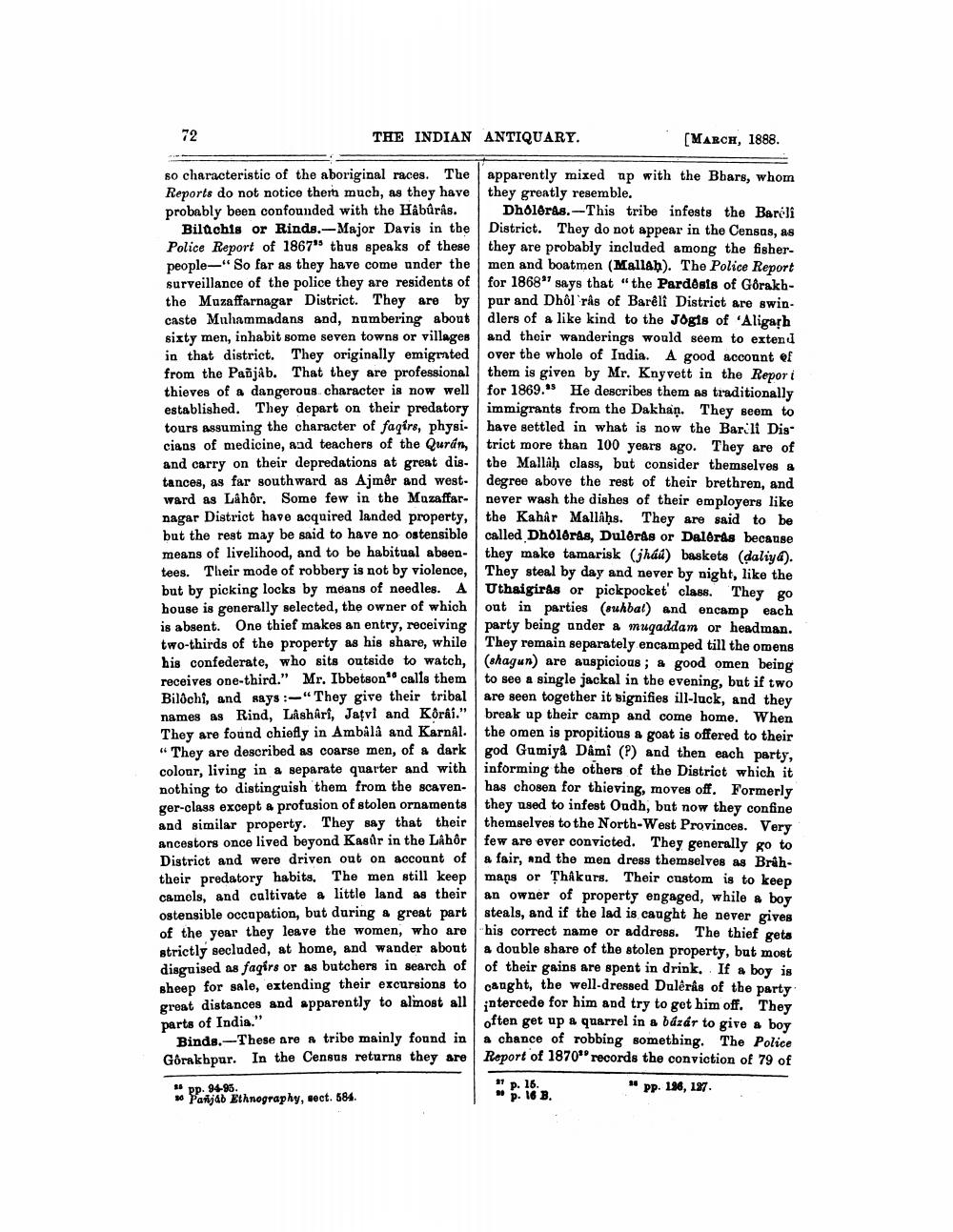________________
72
THE INDIAN ANTIQUARY.
(MARCH, 1888.
so characteristic of the aboriginal races. The apparently mixed up with the Bhars, whom Reports do not notice them much, as they have they greatly resemble. probably been confounded with the Habúrás. Dholeras.--This tribe infests the Bardi
Bilachis or Rinds.-Major Davis in the District. They do not appear in the Censas, as Police Report of 1867" thus speaks of these they are probably included among the fisherpeople-"So far as they have come under the men and boatmen (Mallah). The Police Report surveillance of the police they are residents of for 1868" says that "the Pardėsis of Gorakhthe Muzaffarnagar District. They are by pur and Dhôl râs of Barêli District are swin. caste Muhammadans and, numbering about dlers of a like kind to the Jogis of Aligarh sixty men, inhabit some seven towns or villages and their wanderings would seem to extend in that district. They originally emigrted over the whole of India. A good account of from the Paõjab. That they are professional them is given by Mr. Knyvett in the Repori thieves of a dangerous character is now well for 1869." He describes them as traditionally established. They depart on their predatory immigrants from the Dakhan. They seem to tours assuming the character of faqirs, physi- have settled in what is now the Barili Discians of medicine, and teachers of the Qurán, trict more than 100 years ago. They are of and carry on their depredations at great dis- the Mallah class, but consider themselves a tances, as far southward as Ajmôr and west-degree above the rest of their brethren, and ward as Lähôr. Some few in the Muzaffar- never wash the dishes of their employers like nagar District have acquired landed property, the Kahar Mallâhs. They are said to be but the rest may be said to have no ostensible called Dholéras, Dulérås or Dalbras because means of livelihood, and to be habitual absen- they make tamarisk (had) baskets (daliyd). tees. Their mode of robbery is not by violence, They steal by day and never by night, like the but by picking locks by means of needles. A Uthaigiras or pickpocket' class. They go house is generally selected, the owner of which oat in parties (suhbal) and encamp each is absent. One thief makes an entry, receiving party being under a muqaddam or headman. two-thirds of the property as his share, while They remain separately encamped till the omens his confederate, who sits outside to watch, (shagun) are auspicious; a good omen being receives one-third." Mr. Ibbetson' calls them to see a single jackal in the e
to see a single jackal in the evening, but if two Biləchi, and says :-" They give their tribal are seen together it signifies ill-luck, and they names as Rind, Låshåri, Jațvi and Korái." break up their camp and come home. When They are found chiefly in Ambalâ and Karnal. the omen is propitious a goat is offered to their "They are described as coarse men, of a dark god Gumiya Dami (P) and then each party, colour, living in a separate quarter and with informing the others of the District which it nothing to distinguish them from the scaven- has chosen for thieving, moves off. Formerly ger-class except a profusion of stolen ornaments they used to infest Oudh, but now they confine and similar property. They say that their themselves to the North-West Provinces. Very ancestors once lived beyond Kasar in the Lahôr few are ever convicted. They generally go to District and were driven out on account of a fair, and the men dress themselves as Brihtheir predatory habits. The men still keep mang or Thakurs. Their custom is to keep camels, and caltivate a little land as their an owner of property engaged, while a boy ostensible occupation, but during a great part steals, and if the lad is caught he never gives of the year they leave the women, who are his correct name or address. The thief gets strictly secluded, at home, and wander about a double share of the stolen property, but most disguised as faqirs or as butchers in search of of their gains are spent in drink. If a boy is sheep for sale, extending their excursions tocanght, the well-dressed Dulérks of the party great distances and apparently to almost all intercede for him and try to get him off. They parts of India."
often get up a quarrel in a bázár to give a boy Binds.-These are a tribe mainly found in a chance of robbing something. The Police Gorakhpur. In the Census returns they are Report of 1870* records the conviction of 79 of pp. 94-96.
* Pp. 196, 137 * Parijab Ethnography, sect. 684.
p. 16 B.
31 p. 16.




